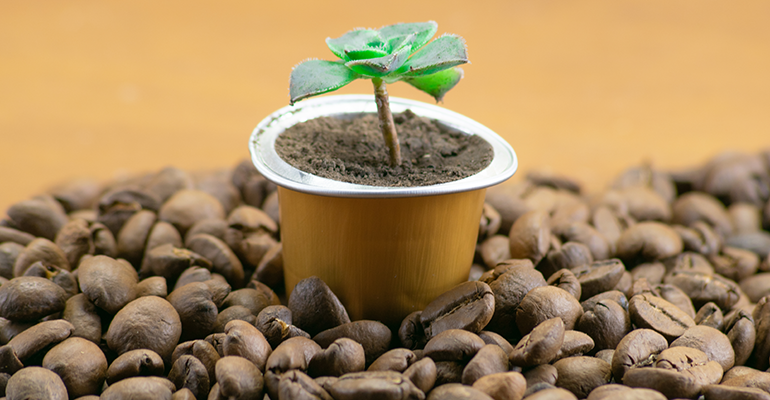Welcome to SJGLE.com! |Register for free|log in
Welcome to SJGLE.com! |Register for free|log in

Related Searches: Tea Vitamin Nutrients Ingredients paper cup packing
Coffee consumption has soared by more than 60% in the past 30 years. Coffee production is rising globally to meet this demand and in turn, is harming the environment and exploiting growers in some of the world’s most disadvantaged nations, according to Solidaridad.

© AdobeStock/gaw004
Over 85%of the world’s coffee supply is sourced from just five countries – Brazil, Vietnam, Colombia, Indonesia, and Honduras. Most coffee producers are smallholder farmers, of which a third earn less than $100 per year from coffee production, according to coffee sustainability platform Enveritas.
A new report co-authored by not-for-profits Solidaridad and Conservation International and coffee sector experts Ethos Agriculture reveals that the future of coffee production globally is at risk, as farmers struggle to make ends meet. Rising input costs for growers paired with the negative effects of climate change and deforestation mean that while the price of coffee rises for consumers across the world, coffee farmers’ livelihoods are under threat.
“Amidst the grand claims of sustainability and rosy promises of a prosperous future in coffee agriculture, the harsh reality faced by coffee producers is marked by price volatility and rising production costs due to higher prices for fertilizers and labour,” the authors wrote.
“Coupled with rampant inflation and the profound consequences of a rapidly changing climate in the most vulnerable origins, the coffee sector finds itself immersed in a state of crisis.”
To ensure the sustainability of the coffee sector, manufacturers must invest in vulnerable regions and collaborate with local stakeholders, such as regulators, producer groups, and civil society, to provide unique solutions to supply chain challenges, the report notes.
Included in the report, the 2023 Coffee Brew Index evaluates the performance of the top 11 coffee roasters globally on the sustainability of their overall production processes.
The ranking, which analyses the policies and commitments made by companies regarding sustainability in the coffee supply chain, is based on four categories: sustainability strategy; social conditions and inclusion; environment; and sustainable purchasing and economic conditions. It is important to note, however, that the evaluation does not consider tangible impact on the ground.
“Any strategy lacking time bound and measurable goals is not a strategy. Commitments with no metric to measure success won’t incentivise the necessary engagement in the supply chain to make meaningful progress,” said Andrea Olivar, strategy and quality director for Latin America at Solidaridad.
The analysis showed that most companies fall short in implementing coherent, trackable, and time-bound targets, despite having high-level strategies to improve the sustainability of their supply chains and engaging in various coffee sustainability initiatives. The report also found that the business operations of various well-known coffee roasters do not align with their ambitious economic, social, and governance (ESG) commitments, largely due to a lack of funding, transparency, and fair pay for small-scale farmers.
Topping the ranking as most sustainable coffee producer, multinational food manufacturer Nestlé is home to three of the world’s largest and most iconic coffee brands - Nescafé, Nespresso, and Starbucks packaged coffee. The company scored highly in strategy and social conditions and inclusion – two areas that it has identified as corporate priorities in recent years through the implementation of sustainability strategies such as the Nescafé Plan and Nespresso AAA Sustainable Quality Programme.
 © AdobeStock/studio GDB
© AdobeStock/studio GDB
According to the company, 88% of its coffee was produced via sustainable means in 2022. Nestlé has committed to up this figure to 100% by 2025 and plans to implement regenerative agriculture policies across various countries, focusing on the seven from which 90% of its coffee is sourced, including Brazil, Colombia, Mexico, and Vietnam. As part of the Nescafé Plan 2030, the company has pledged to invest 1.04 billion euros before the turn of the decade in an integrated strategy to transition coffee farmers to regenerative and resilient practises, funded by Nestlé’s investments in regenerative agriculture and net zero.
Global food manufacturer Kraft Heinz, which has coffee brands such as Maxwell House and Gevalia in its portfolio, ranked lowest of the 11 companies assessed in the index. Across all four criteria, the company was marked as ‘in development’ or ‘laggard’, scoring lowest (zero points) in the economic conditions category. Kraft Heinz was the only company of the 11 included in the analysis that failed to reply to questionnaires sent out by the researchers.
US-based food manufacturer J.M.Smucker, owner of brands including Folgers, Dunkin’ Donuts and Café Bustelo followed Kraft Heinz, ranking in at second-to-last position.
“The trade of commoditised coffee at affordable prices continues to promote an extractive model of production that results in widespread poverty among small-scale farmers and thus prevents comprehensive sustainability within the coffee sector,” the researchers wrote.
The complete list of companies included in the ranking from best to worst consist of: Nestlé, Starbucks, JDE Peet’s, Tchibo, Lavazza, Melitta, Massimo Zanetti, UCC, Strauss, J.M.Smucker, and KraftHeinz.
E-newsletter
Tags